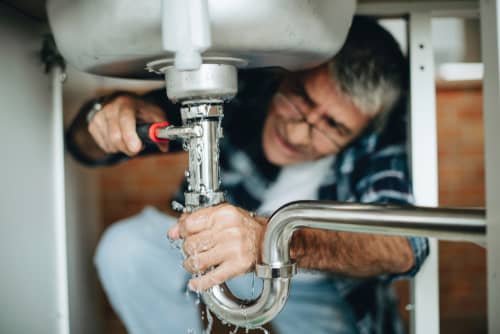Your home is almost certainly the most expensive thing you’ll ever own and as such, knowing the ins and outs of how it works and what you can do to keep it in tip-top condition is always a good idea. This goes double for the plumbing. Having a basic grasp of your home’s water supply can help save you money, maintain your property’s value, and avoid damage to your home. So here are our top 10 plumbing tips that every homeowner should know:
1. Know Your Home’s Plumbing Layout
There are a few layers to this.
Starting with the very basics – locate your home’s shut-off valve! This will be needed for any leaks, repairs or replacements you may have to do while you live there. Knowing how to stop the flow of water is an absolute must for any home owner.
Next, find out where any sewer access points may be. If there’s a blockage, this will save you a lot of time and money.
Have a rough idea about where all the pipes are in your home and where they all go. You can obtain a blueprint from whoever built your home or create your own by following the exposed parts as far as you can.
2. Master The Main Shut-Off Valve
As we said above, knowing where your main shut-off valves are is an absolute must. These plumbing tips can really help save your pocket in the case of emergency.
Exactly where the main shut-off valve is will vary from property to property, but it’s usually fairly close to where the water supply enters your home. If you have a metered property, it’s probably right next to the meter.
It may be a tap or a simple lever but whichever design you have, the purpose is the same- to shut off the water quickly and completely. You may want to do this when:
- Dealing with disaster: from a burst pipe to a seeping leak, it’s easier to fix without water getting all over the floor.
- Replacing appliances and fittings: if there’s no individual shut-off for your washing machine or dishwasher, you’ll need to turn off the water to the whole home.
- Leaving for the winter: cutting the water supply and leaving taps open can help avoid burst pipes.
3. Prevent Frozen Pipes
This plumbing tip seems a natural follow on to the last- you don’t want your pipes freezing and bursting.
As water freezes, it expands (the molecules form little rings and the space in the center is what causes this effect). As it expands, it needs space to expand into. When it’s contained in a pipe, that space is limited.
Frozen water pushes against your pipes, weakening it. When it thaws suddenly, the rush of water from behind it can be enough to cause them to burst, spilling huge amounts of water over your home.
To avoid this fate, stop them from freezing in the first place by ensuring that they’re kept warm when you’re not home in the cold weather. Some heating systems will have frost protection settings for these situations.
If the pipe is located outside it can be trickier, but an insulating jacket can help a lot.
If you have to go away for an extended period over the winter, leaving your taps running at a trickle can keep the water flowing and help avoid freezing too.
4. Regularly Check For Leaks
Keeping an eye out for leaks, especially around faucets, joints and toilets can save you thousands in the long run.
The most obvious sign will be water dripping from the leaking fitting, but sometimes it can be more subtle. Keep an eye out for discoloration on your pipes and fittings as this can often be a sign of a seeping leak.
Leaks have a tendency to get worse over time and water damage can be very, very expensive to repair.
5. Understand Water Pressure
Our next plumbing tip concerns water pressure.
While low pressure is mostly an annoyance rather than a problem (who wants a trickle of a shower in the morning?) it can cause some serious efficiency issues.
High pressure however can cause serious damage to your fixtures and fittings as water jets around your home.
To find out how much pressure your water is under you can use a pressure tester or, for a rougher idea, the bucket test. Simply time how long it takes your faucet to fill a bucket of a known volume and that will give you an idea of the flowrate in your home.
If you find it needs adjustment, you can install a pressure valve or simply turn the shut off valve slightly.
6. Maintain Your Water Heater
Hot water is one of those little luxuries that we in the modern world take for granted, right up until it fails and we realize just how much we rely on it.
Looking after your water heater, no matter which type of system you may have, will pay dividends in the long run.
Schedule a yearly inspection and cleaning to avoid any issues developing and ensure you can always have a nice warm bath or at least wash the dishes with a minimum of fuss.
If you start hearing funny noises, notice odd smells, discoloration in the water or around the joints leading to and from the tank, it’s time to call in a pro before you discover just how cold a cold bath can be.
7. How To Deal With Clogs
Clogs are an unfortunate fact of life. Knowing how to deal with them quickly and efficiently makes life much easier.
Depending on where the clog is and what is causing the blockage in question there are a few tips and tricks to get things draining again.
- Run the Hot Water: This will help break down and grease and flush it away.
- DIY Recipes: A mix of baking soda and vinegar can bubble away blocks.
- Plunger vs Snake: there are a few tools that can help deal with blockages in different places.
- Plungers are great for forcing a blockage down a pipe but can sometimes end up just moving the problem from one place to another. Use a flanged one if you’re unblocking a toilet.
- Plumbers snakes: these flexible augurs are great for fishing out hair or breaking up food blockages from your sinks
- Chemical Cleaners: While they should generally be avoided (as we’ll cover in a minute) chemical cleaners can help dissolve clogs that you simply can’t shift otherwise.
Bonus tip: The toilet trick
If you find yourself with a blocked toilet and no plunger or augur, try pouring liquid soap or washing-up liquid down it, letting it settle then throwing a bucket of very hot (not boiling) water down it. It’s not fool-proof but it can get you out of an embarrassing situation.
8. Don’t Use Chemical Drain Cleaners
As we alluded to above, chemical drain cleaners are only to be considered when you’re out of other options. It’s serious enough to warrant its own entry on our list.
These usually consist of a fairly powerful acid which works on the clogs. The problem comes from the fact that they also work on the pipes around the clog, albeit to a lesser extent.
Repeated usage for cleaning will cause more damage than it prevents. Save them for serious clogs.
9. Proper Disposal Use
Garbage disposals are great but they’re not for all kinds of trash.
Make sure you’re only using yours for food waste and avoid things like bones getting into it- they’ll jam it and break it.
It’s also a good idea to run the cold water when you’re using it to ensure that the pulverized muck is flushed fully away. Keep the faucet on for another 30 seconds after your finished to get rid of anything lingering in there.
10. What Not To Flush Or Pour Down Drains
Our final plumbing tip concerns drain discipline.
While it’s tempting to think of the drain or the toilet as a magic gateway to oblivion for things we want rid of, it really isn’t. There are certain things that should never, ever, under any circumstances be flushed or poured away.
- Diapers
- Kitty-litter
- Wet-wipes (some are sold as ‘flushable’- they’re not)
- Feminine hygiene products
- Food waste
- Fats
- Oils
- Grease
- Hazardous chemicals
- Paper towels and tissues (except toilet paper)
Not only are many of these an environmental nightmare, they’re shockingly bad for the condition of your plumbing too. The seeming convenience of simply flushing it away disappears when you suddenly need a plumber to come and fix the chronic blockage.
So there we have it, 10 simple plumbing tips that any homeowner should know.

